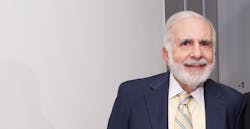Xerox CEO Resigns in Icahn Win That Threatens Fujifilm Takeover Deal
Xerox Corp.’s top executive and six board members agreed to step down in a victory for Carl Icahn’s battle against the company’s planned $6.1 billion takeover by Fujifilm Holdings Corp.
The resignations, which include Chief Executive Officer Jeffrey Jacobson and Chairman Robert Keegan, are part of an agreement with activist investors to settle a lawsuit that will put in place executives close to Icahn. Keith Cozza, CEO of Icahn Enterprises, is expected to be elected chairman while John Visentin, who has been a consultant to Icahn in the feud against Xerox, is slated to be appointed as its new CEO.
The surprise settlement potentially puts the deal struck in January with Fujifilm at risk, and comes after a New York judge last week temporarily halted the transaction. The news is a major win for Icahn and Darwin Deason, who railed against the terms of Fujifilm’s takeover of Xerox and accused Jacobson of striking the deal without the board’s authorization to preserve his own job.
The new board plans to meet immediately to evaluate alternatives, “including terminating or restructuring Xerox’s relationship with Fujifilm and the proposed transaction with Fujifilm,” according to a company statement. Xerox said it approached the Japanese maker of office products to sweeten the deal, but said Fujifilm hasn’t made a proposal to enhance the transaction terms.
Fujifilm said it has “serious concerns” about the announced settlement and plans to appeal the court ruling that temporarily blocked the takeover deal, according to a statement Wednesday. The Japanese company said Xerox’s new board has an obligation to comply with the deal’s agreements.
“We believe the record shows our good faith and arms-length negotiations for the benefit of all shareholders,” it said.
The Japanese company’s shares dropped as much as 6.2% in Tokyo trading Wednesday, the most in three months.
“It cannot possibly be, sentiment-wise, very positive for Fuji,” said Amir Anvarzadeh, senior strategist at Asymmetric Advisors in Singapore. “It might actually force Fuji to put a higher bid.”
The feud between the shareholders and the once-iconic American company is among a spate of recent activism that focuses on bolstering shareholder value. Billionaire Paul Singer’s activist fund, Elliott Management Corp., is escalating pressure on Hyundai Motor Group on a plan to merge units.
Xerox, whose name became synonymous with office products, has faced difficulties as Canon Inc. and Asian competitors eroded its dominance while email and other electronic communications slashed the demand for its products. The feud has been long-running, with Deason and Icahn pushing Xerox to explore alternatives and shake up its joint venture with Fujifilm before the deal was announced, while also calling for Jacobson to be replaced.
Watershed Moment
Icahn hailed the Xerox agreement. He and Deason are among the largest shareholders with a combined 13%.
“This agreement marks a watershed moment for corporate governance generally and for Xerox specifically,” said Icahn in the statement. “With new leadership in place, we believe Xerox will be much better positioned to take advantage of multiple potential value-enhancing opportunities, including restructuring its relationship with Fujifilm.”
Icahn alluded to tensions with Fujifilm, “our supposed ‘partner’ whose conduct over the last year is more unbelievable than what you see on fictional TV shows like ‘House of Cards’ or ‘Billions’.”
Under the terms of the deal announced in January, Xerox, which has a market value of $8.2 billion, would first merge with a joint venture that the company operates with Fujifilm in Asia. Tokyo-based Fujifilm would ultimately end up owning 50.1% of the combined entity, which would expand the joint venture to encompass all of Xerox’s operations. Xerox holders would receive a cash dividend of $9.80 a share under the proposed transaction.
Jacobson, who joined Xerox in 2012 and became CEO at the beginning of last year, was slated to lead the newly combined company.
The developments could be disappointing for Fujifilm investors as the transaction was expected to help the Japanese company expand its documents solutions business, establish a global presence and lower its costs, said Bloomberg Intelligence analyst Simon Chan.
“It’s a setback for Fujifilm,” he said.
The agreement requires the company to hold its annual meeting within four months. The Xerox defendants denied any wrongdoing and agreed to the settlement to eliminate the risk of further litigation, the company said. The settlement must still be approved by a New York judge in Manhattan, according to a court filing.
By Scott Deveau and Lisa Du
About the Author
Bloomberg
Licensed content from Bloomberg, copyright 2016.
